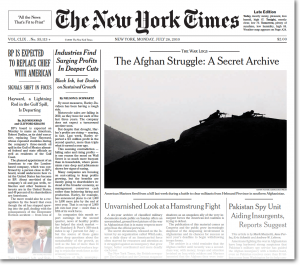Published July 26, 2010

The New York Times is a traditional news organization that broke a non-traditional organization's story.
They’re calling it this generation’s Pentagon Papers. WikiLeaks (@wikileaks) releases 90,000 classified documents that don’t reflect well on the American campaign in Afghanistan. The White House, stunned and embarrassed, rushes to defend the war effort.
Unlike in Vietnam, however, Boston University Professor Andrew Bacevich says the documents don’t tell us much about Afghanistan that we don’t already know. And the documents are unlikely to change operations on the ground.
Bacevich says the WikiLeaks story is more interesting in what says about the evolution of “information warfare” (emphasis mine):
Rather than being defined as actions undertaken by a government to influence the perception of reality, information warfare now includes actions taken by disaffected functionaries within government to discredit the officially approved view of reality. This action is the handiwork of subversives, perhaps soldiers, perhaps civilians. Within our own national security apparatus, a second insurgent campaign may well have begun. Its purpose: bring America’s longest war to an end. Given the realities of the digital age, this second insurgency may well prove at least as difficult to suppress as the one that preoccupies General Petraeus in Kabul.
Bacevich writes for The New Republic as part of a news partnership with NPR and WBUR.
Dan Kennedy, the Northeastern journalism professor, says it was wise for WikiLeaks to release the documents to traditional news organizations well in advance. It lets WikiLeaks get out of the way so “real journalists” own the story.
Earlier this year, WikiLeaks and its founder, Julien Assange, got a lot of attention over a video it had obtained of an American helicopter firing on civilians in Iraq, including two Reuters freelancers. Ultimately, though, it proved to be the wrong kind of attention — the heavy-handed editing made it appear more like an anti-American propaganda film than documentary evidence. (WikiLeaks also released a longer, unedited version.)
By contrast, in providing the latest documents to news organizations, Assange was able to get out of the way and let credible journalists tell the story. Jay Rosen, in a characteristically thoughtful post about WikiLeaks (“the world’s first stateless news organization”), thinks Assange did it because he knew the story wouldn’t get the attention it deserved unless the traditional media could break it.
“The world’s first stateless news organization.” Interesting.
On Twitter, I asked readers to tell us what they make of the leaks. @laurelatoreilly in Cambridge replied:
Complicated topic; transparency is good but so is nat’l security
@seanmatthew1 in Boston tweeted:
we need to know what our military is doing, secrecy is dangerous to democracy
To which @ellenrossano in Hingham replied:
While we need to have oversight of the military, nothing should endanger current operations & troop safety.
What do you make of the leaks? Can transparency and security co-exist?
Further Reading: